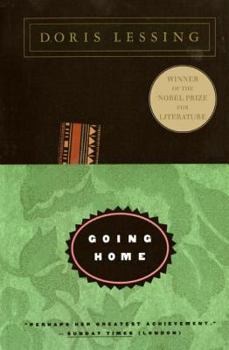Going Home
Select Format
Select Condition 
Book Overview
Africa belongs to the Africans; the sooner they take it back the better. But--a country also belongs to those who feel at home in it. Perhaps it may be that love of Africa the country will be strong enough to link people who hate each other now. Perhaps... Going Home is Doris Lessing's account of her first journey back to Africa, the land in which she grew up and in which so much of her emotion and her concern are still invested. Returning to Southern...
Format:Paperback
Language:English
ISBN:0060976306
ISBN13:9780060976309
Release Date:March 1996
Publisher:Harper Perennial
Length:256 Pages
Weight:0.50 lbs.
Dimensions:0.6" x 5.3" x 8.0"
Customer Reviews
1 rating
A review of Going Home by Doris Lessing
Published by Thriftbooks.com User , 17 years ago
It is fifty years since Doris Lessing published Going Home, an account of her return to Rhodesia, the country where she grew up. By then in her thirties, she had already achieved the status of restricted person because of her political allegiances and her declared opposition to illiberal white rule. These days Zimbabwe makes the news because of internal strife and oppression. It is worth remembering, however, that fifty years ago the very structures of Southern Rhodesian society were built upon oppression, an oppression based purely on race. Fifty years on Doris Lessing's Going Home an historical record of this noxious system, a record that is more effective, indeed more powerful because of its reflective and observational, rather than analytical style. Doris Lessing, a one-time card-carrying Communist, laid a large slice of the blame for the perpetuation of discrimination firmly at the door of the white working class. Though not all white workers were rich - indeed she records that many were abjectly poor - what they had and sought to preserve was an elevated status relative to the black population. She describes white artisans as white first and artisans second. Though trade unions actively sought equal pay for equal work, they never campaigned for any kind of parity for black workers. On the contrary, they demanded the maintenance of racially differentiated pay rates. How's that for the spirit of socialist internationalism and brotherhood! (I accept there is a misplaced word there...). In fact Doris Lessing records that it was the relatively liberal capitalist enterprises that demanded more black labour, their motive of course arising from cost savings, not philanthropy. So trade unions spent much of their time making sure that companies hired their quota of higher paid, white labour. Even in the 1950s, she remarks on the likelihood that many Africans were already better educated than their white counterparts. White youth shunned education as unnecessary, while Africans saw it as a possible salvation. She notes that the people who treated the African population the worst were recent immigrants from Europe, particularly those from Britain, who tended to be less educated themselves and drawn from the ranks of the politically reactionary. Such people, apparently, were equally critical of immigrants from southern Europe, and expected Spaniards and Greeks to work for African wages, not the white wages that they themselves demanded. The situation in Rhodesia, clearly, had to change. Not only was such crass discrimination unsustainable, it was also comic, as are all racially posited class systems. While the South Africans over the border created honorary whites of the Japanese they increasingly had to do business with, the Rhodesians went through their own equally idiotic contortions. An example of such nonsense is quoted by Doris Lessing when she remarks that there was a privileged group of Africans who were granted the right not to carry passes






